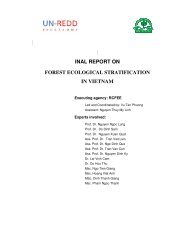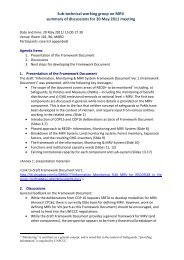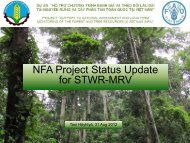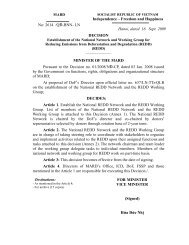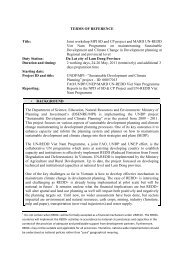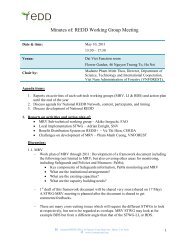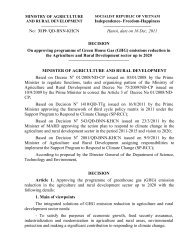MINUTES OF KICK-OFF MEETING SUB ... - REDD - VietNam
MINUTES OF KICK-OFF MEETING SUB ... - REDD - VietNam
MINUTES OF KICK-OFF MEETING SUB ... - REDD - VietNam
You also want an ePaper? Increase the reach of your titles
YUMPU automatically turns print PDFs into web optimized ePapers that Google loves.
<strong>MINUTES</strong> <strong>OF</strong> <strong>KICK</strong>-<strong>OF</strong>F <strong>MEETING</strong><strong>SUB</strong>-TECHNICAL WORKING GROUPON ENVIRONMENTAL & SOCIAL SAFEGUARDSVenue: Meeting Room 101, Building B9, 2 Ngoc Ha, Ba Dinh, Ha Noi[Co-chair comments in square brackets]Time: 13:30 – 16:30. Date: 28 February 2012Objectives:- Sub-Technical Working Group on Safeguards (STWG-SG) terms of reference (ToR) agreed- STWG-SG 2012 annual work plan (AWP), with milestones, agreed- Second meeting agenda outlined- Awareness of existing options for national operationalisation of safeguards raised[All objectives achieved; comments received on ToR and AWP and revised versions will beshared in advance of the second STWG-SG meeting]Agenda:Time Items Responsible people13.30 – 13.45 Introduction of participants All13.45 – 14.00 Introduction to Cancun safeguards in VNFORESTrelation to national <strong>REDD</strong>+ programmeand wider forestry sector policy14.00 – 14.15 National options to operationalize SNVsafeguards14.15 – 14.30 Introduction to HB-<strong>REDD</strong>+ project in SNVrelation to the STWG-SG14.30 – 15.00 Presentation of STWG-SG of terms of VNFORESTreference15.00 – 15.15 Presentation of STWG-SG 2012 work plan SNV15.15 – 16.00 - Discussion and agreement on terms of Allreference and work plan16.00 – 16.15 - Agreement on agenda items and Allscheduling of next meeting16.15 – 16.30 Any other business AllExpected outputs:- Final agreement on ToR of STWG-SG[revised ToR to be circulated in advance of second STWG-SG meeting]- Final agreement on AWP of STWG-SG in 2012[co-chairs to work with technical partners to elaborate details of AWP steps under results areas]- Contents and plan for next meeting[draft agenda for second STWG-SG meeting to be circulated in advance of the meeting]
PROSECUTING CASES <strong>OF</strong> DOMESTIC VIOLENCE?What is Domestic Violence?“Domestic Violence” is a general term todescribe a range of behaviour often usedby one person to control and dominateanother with whom they have, or havehad, an intimate or family relationship.When taking decisions as to prosecutionin cases of Domestic Violence the PublicProsecution Service (PPS) adopts thefollowing definition: “Any criminaloffence arising from any incident ofthreatening behaviour, violence or abuse(psychological, physical, verbal, sexual,financial or emotional) inflicted on oneperson by another where they are or havebeen intimate partners or familymembers, irrespective of gender orsexual orientation.”What is the role of the PPS incases involving DomesticViolence?The PPS decides whether or not toprosecute people for committing criminaloffences. It decides what the correctcharges should be and is alsoresponsible for prosecuting the case atcourt. The PPS is independent ofGovernment and the Police Service forNorthern Ireland (PSNI) when carrying outits functions. No one can make the PPSprosecute a particular case nor stop itfrom doing so.Does the PPS investigate crimeinvolving Domestic Violence?No. Crimes are investigated by the PSNI. When thePSNI investigate a crime, they send a file to the PPSto decide who is to be prosecuted and for whatoffences.Does the PPS prosecute cases onbehalf of the victim of DomesticViolence?The PPS prosecutes cases on behalf of the wholecommunity, not on behalf of any one individual. Forthis reason, the views of the victim, while importantand fully taken into account, cannot be the onlyconsideration when deciding whether or not toprosecute.Who makes the decision for oragainst prosecution in casesinvolving Domestic Violence?All decisions are made by public prosecutors whoare qualified lawyers of appropriate experience.How does the PPS reach a decisionto prosecute in cases involvingDomestic Violence?When the PSNI complete their investigation, theysend a file to the PPS. The prosecutor must decidewhether there is sufficient evidence to put a personon trial. Prosecutions are initiated by the PPS whereit is satisfied that the Test for Prosecution is met.The Test for Prosecution is a two stage test asfollows:i. The Evidential Test: The evidence which can beadduced at court is sufficient to provide areasonable prospect of conviction.In order to convict the judge or jury have to besatisfied beyond a reasonable doubt that a personis guilty. It is not enough for them to think thatthe accused might be or is probably guilty.For this reason it is important to know if there isindependent evidence that supports the victim’saccount. This could be evidence from a witnessor forensic evidence such as fingerprints orbloodstains. Independent evidence can make astronger case than a case based on one person’sword against another’s.ii. The Public Interest Test: prosecution isrequired in the public interest.Each of these stages must be consideredseparately and passed before a decision toprosecute can be taken.The decision to prosecute or not to prosecute isvery important. If someone is prosecuted andlater found not guilty they are likely to sufferdisruption and worry. On the other hand, adecision not to prosecute can cause greatdistress and upset to a victim. So the PPS mustcarefully consider whether or not to prosecute.Why might the PPS decide not toprosecute a case involvingDomestic Violence?Lack of sufficient evidence is the mostcommon reason for decisions not toprosecute. If there is not enough evidenceto provide a reasonable prospect that acourt will be satisfied that a person is guilty,the prosecution will not go ahead.Even where the victim’s account is credible,the evidence may simply not be strongenough to prosecute anyone.The above explanations are a simplifiedversion of the Code for Prosecutors. Pleasecontact the PPS if you would like a copy.Alternatively, it is available on our website:www.ppsni.gov.ukWhat happens when a victim ofDomestic Violence withdrawssupport for the prosecution orno longer wishes to giveevidence?This does not mean that the case willautomatically be stopped. The PPS will haveto find out why the victim has made thisdecision as he/she may be in fear of theperpetrator or is being subjected to pressureor intimidation. The PPS will request policeto obtain a written statement from the victimexplaining the reasons for withdrawingsupport and confirming whether the originalstatement was true. The PPS will ask thepolice to carry out an assessment of therisks to the victim, any child and any otherperson’s safety.PROSECUTING CASES <strong>OF</strong> DOMESTIC VIOLENCE?
# Name Organisation Contact12 Dr. Thu Huong GiZ 090402444513 Hoang Cam Centre for Culture Hoangcamvn@gmail.comResearch14 Tillem Burlace SRD tillem@srd.org.vn15 Nguyen Thi Thu Huyen UN-<strong>REDD</strong> Vietnam Nguyen.huyen@unredd.org.vn16 Tran Huu Nghi TBI Viet Nam nghi@tropenbos.vn17 Pham Manh Cuong VRO/VNFOREST18 Hoang Thanh Nhan BCA/MONRE Thanhnhan.bca@gmail.com19 Duong Van Tho PanNature thodv@nature.org.vn20 Vu Thi Hien CERDA tranvuhientk@yahoo.com21 Nghiem Phuong Thuy VNFOREST thuybluemoon@gmail.com22 Nguyen The Chien SNV hsathingoc@snvworld.org23 Sa Thi Ngoc Ha SNV cnguyenthe@snvworld.org24 Nguyen Trung Thong SNV nguyentrung@snvworl.org25 Steven Swan SNV sswan@snvworld.org




